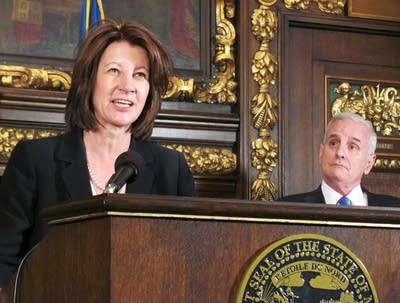MinnesotaCare can be preserved, commissioner says
Go Deeper.
Create an account or log in to save stories.
Like this?
Thanks for liking this story! We have added it to a list of your favorite stories.

By STEVE KARNOWSKI
Associated Press
MINNEAPOLIS (AP) — State and federal officials have come up with a way to preserve Minnesota's subsidized health care plan for the working poor when the federal health overhaul takes effect, Minnesota's human services commissioner said Wednesday.
Around 130,000 Minnesotans are currently enrolled in MinnesotaCare, which helps cover premiums for people who make too much to enroll in Medicaid but not enough to afford regular insurance. However, the program as currently structured conflicts with the federal health law, meaning many participants were facing the prospect of sharply higher premiums. State officials had been trying for months to get answers from Washington on how to prevent that from happening.
The guidance issued Wednesday by the federal Department of Health and Human Services means at least 38,000 and possibly more than 90,000 people will get to stay in a revamped MinnesotaCare, depending on how several moving pieces ultimately fit together, said Jeremy Drucker, a spokesman for the state human services agency. Many of the rest are expected to qualify for an expanded Medicaid program awaiting approval from the Legislature.
Turn Up Your Support
MPR News helps you turn down the noise and build shared understanding. Turn up your support for this public resource and keep trusted journalism accessible to all.
"It provides a framework for Minnesota and the federal government to partner together to ensure continuation and improvement of MinnesotaCare, and will enable thousands of low-income working Minnesotans to experience the benefits of significant health reform," Lucinda Jesson, the state's human services commissioner, said in a statement.
One of the centerpieces of the federal overhaul will be the creation of health care exchanges — online marketplaces where individuals and small businesses can go to sign up for health insurance and find out how much financial help they qualify for. About a quarter of all Minnesotans are expected to get their coverage through the state's exchange. However, for thousands of people in MinnesotaCare, the plans they would buy via the exchange were expected to cost them more than the coverage they now get.
Minnesota's U.S. senators, a bipartisan group of state legislators, and interest groups teamed up to lobby Health and Human Services Kathleen Secretary Sibelius to protect the MinnesotaCare participants who would have fallen through the cracks of a federal plan that's supposed to make health insurance more affordable. Minnesota now has a clearer path for how to do that, with federal funding, through a provision of the Accordable Care Act called the Basic Health Program, the state agency said.
State officials still face tight deadlines for working out all the details of how the federal overhaul will work in Minnesota. Open enrollment in Minnesota's exchange is due to begin in October and coverage through the exchange takes effect in January.




